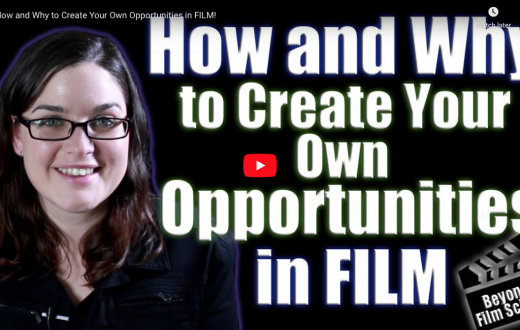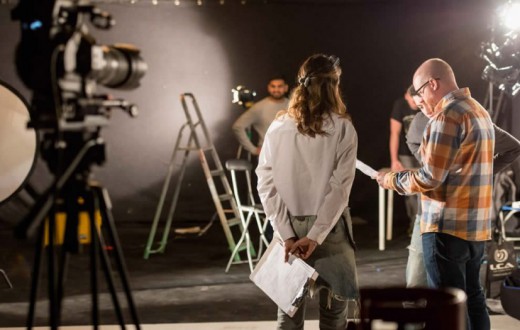The whole world seems to be focused on Westeros right now as the final season of HBO’s Game of Thrones gets rolling – as of this writing already one-sixth of the way over (arrrgghh!!). The epic fantasy’s tales of ancient families fighting over the Iron Throne became one of the most respected television series of all time largely due to an amazing collection of actors who are now household names.
And one thing that’s easy for younger actors to do is to focus strictly on the success of actors we admire, especially the younger ones like Sophie Turner (Sansa Stark) and Maisie Williams (Arya Stark). What people tend to forget is the effort it took to get there.
“Why not me??” is the refrain you often hear from younger actors.
Well, why not indeed? And truly, there’s no reason why you can’t be a successful actor on your own terms. But the dangerous part of playing the “why not me” game of envy is that it distracts you from doing the very things you need to do in order to get to the level of success you want.
For most of us, “success” as an actor means paying the bills via a regular income and steady work performing in rewarding roles in the craft we love. But when you’re starting out, even that can seem like a pipe dream that’s miles away from reality. The sense that you’re never going to get there can cause younger actors to get frustrated and even give up altogether sometimes, which is really tragic.
Here’s the thing: every one of those Game of Thrones actors that we know and love has worked very, very hard to get where they are today. And when you’re starting out, hard work doesn’t just mean blowing away your classes and showing up on set ready to rock when you do book a job – you’ve got to put in some effort to get yourself seen in order to land those jobs in the first place. So rather than pining for your own chance to play a character on GoT, here’s what you should be doing instead.
1. No Agent Yet? Direct Submitting Is Your Key
One of the big comments I get from shiny-faced young actors showing up for their second or third class is, “How do I get an agent? Should I send my resume and headshot out to a bunch of agents I look up online?” The truth is you really don’t want to do that, not yet. Now, you might get lucky, or perhaps you have a highly unique and sought-after look. But it’s more likely that until you’ve built yourself up a body of work sufficient to put together a professional reel and show yourself capable of playing a variety of character types with some depth and nuance, you’re wasting your time – and perhaps even hurting your chances by cold-calling a bunch of agents and CDs. The one thing you DON’T want to get a name for is being that annoying kid who won’t stop harassing agents when he’s not ready yet! So for you at this stage of the game, direct submitting yourself to specific projects is vital to getting your name out there in the right way, and booking yourself some work. This is where the rubber meets the road for younger actors, and it’s your best chance of landing yourself not only some paid roles, but also of gaining valuable experience by doing some challenging, fun work that will help you build up your resume and your reel. While you may think that having graduated from a theater program and taking a few outside classes means your education is done, nothing could be further from the truth. There’s always so much more to learn when it comes to not only the nuts and bolts of acting itself, but also in terms of what to do on set, how to conduct yourself, protocols, expectations – hell, just learning what it means to stay fresh and ready to work over the course of a 12-hour day when you’ve got one more set-up to go is a big lesson. There are a million little details of what it takes to come across as a professional working actor that honestly can’t be taught except through experience. Not only that, the experience of being in front of the camera when the director or AD yells action and you’re expected to hit your marks and remember your lines is another invaluable lesson that can’t be learned in a classroom. And at this point in your career you’ve got to book yourself some roles via self-submitting in order to get yourself to the level of professionalism as well as technical acting skill needed for an agent to take notice.
2. It’s A Numbers Game So Don’t Give Up
If you’re truly on board with the idea of carving out a career in acting, then you know as well as I do that nothing can match the joy we actors get to experience, the sheer unbridled rush of energy and adrenaline and happiness and connection with our fellow humans that we get from doing our best work when we’re at the top of our game. What you might not know yet is that it also takes some effort to get yourself to the point where you get to experience that regularly on a working basis. This isn’t meant to scare you off – quite the opposite in fact. I’m saying this to hopefully help you gear up mentally to absolutely NOT give up even in the face of the numbers game that is getting yourself seen when you’re just starting out. For instance, while you’ll notice as you peruse the Casting Notices on NYCastings that there might be a hundred productions on there every day that are looking for actors, keep in mind that the CDs working on each of those productions are likely to receive hundreds of headshots, resumes and reels. So if you just self-submit a few here and there and then give up when you don’t hear back, you’re really not doing justice to your career – nor to your passion for acting. Think of yourself as your own agent at this point in your career: should you hire an agent who gets discouraged after submitting his or her client a few times when it results in rejection? Would you hire an agent who says in the face of a handful of rejections, “Oh well, we tried. This is just too hard!” I’m guessing not. Keep at it, keep grinding and good things will happen. Especially if you…
3. Get Better
As I said, getting your acting career off the ground in terms of self-submitting is a numbers game. The other numbers game actors have to keep in mind is the sheer number of people who are trying to do exactly what you’re doing. There’s a lot of us out there, guys. And while the upside is there are so many opportunities for actors these days given the plethora of cable and internet channels that are producing their own movies and series, there are also so many actors out there fighting for their own piece of the pie just like you are. This means that sitting on your ass isn’t an option, not if you’re hoping to succeed. So we’ve talked a lot about being your own agent, and what that means for how you’re going to represent your client and how hard you’re willing to work for him or her. Now let’s talk about how you the actor can make it easier on your “agent” to rep you. When you self-submit to a production, you’re essentially selling a product sight unseen to the casting director and the production team. So let’s give them something to get excited about!
- Are your headshots professionally done and up to date? Get some new ones.
- Is your reel bursting with compelling scenes and monologues? Get some new ones! While you’re self-submitting, you can also be working on student films, hammering out scenes and monologues in acting class and in your actor’s group, and recording them.
- Is your self-tape game top-notch? Get better! In the rapid-fire world of self-submissions, you’ve got to be ready to bang out a self-tape audition in a heartbeat. I’ve talked to numerous CDs who say that, even if the “deadline” for a self-tape is a few days off, if an actor hasn’t sent hers in within 24 hours of the post going up, she’s not likely to be considered because it doesn’t seem like she’s serious. So practice your self-taping to the point where you can create good, high-quality work and turn it around in a short period of time.
Look, hard work as an actor isn’t a guarantee of success. But one thing we know for sure is that giving up is a guarantee you will fail. So quit reading and get to submitting!







